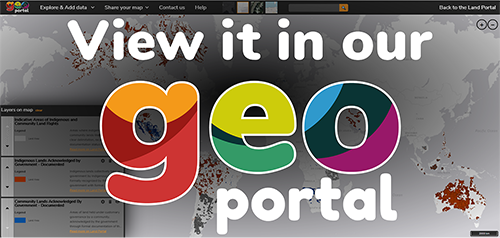Community Land Delimitations in Mozambique
The "Delimitações de Terras Comunitárias" layer represents the aggregated delimitations of community lands in Mozambique, compiled by various entities over the years. This layer includes:
- Community Boundaries: The spatial limits of each community.
- Delimitation Documents: Process documentation for community delimitations, which may need further completion or improvement.
- Population Estimates: Estimated population for each community.

view it in geoportal
Why Does the Dataset Matter?
The "Delimitações de Terras Comunitárias" dataset is crucial for understanding and managing land governance in Mozambique. It provides a detailed and transparent view of community land boundaries, helping to safeguard the rights and livelihoods of local communities. By making this data publicly accessible, it supports legal recognition, conflict resolution, and sustainable land use planning.
Problem, Policy Implementation Monitored
This dataset addresses the problem of unclear land boundaries and the risk of land conflicts. It monitors the implementation of Mozambique's Land Policy, adopted in November 2022, which emphasizes the importance of accurate and up-to-date land information as part of a good governance agenda. The policy calls for mechanisms that ensure public access to information on the legal status of lands and integrated planning and monitoring systems involving various governance levels and local communities.
Gap Filled by Indicator Set
The dataset fills a critical gap by providing comprehensive, validated information on community land delimitations, which was previously fragmented or inaccessible. This helps local communities assert their land rights and supports governmental and non-governmental organizations in land governance and development planning.
Why Does the Dataset Matter for the Land Governance Community?
The dataset is essential for the land governance community as it provides:
- Accurate Community Boundaries: Clear delineation of land used by communities.
- Delimitation Documents: Documentation of the delimitation process, aiding in legal validation and historical record-keeping.
- Population Estimates: Data on the population within each community, crucial for resource allocation and development planning.
Issue the Indicator Set is Related To
The indicator set is related to land tenure security, conflict resolution, and sustainable land use. Specific indicators chosen from the dataset include:
- Number of communities with legally recognized boundaries.
- Number of delimitation documents completed and verified.
- Population estimates per community area.
Status of the Dataset
- Data Release: The dataset has been compiled over several years from various sources.
- Publication Date: The data was published through the MADICO Geoportal, with updates and new submissions continuously integrated.
Methodology
The dataset is compiled using participatory rural appraisals, geo-referencing, and validation processes involving local communities, NGOs, and government agencies. The methodology includes:
- Questionnaire: Example questions include details about land usage, boundaries, and cultural sites.
- Geo-referencing: Communities use GPS tools to map boundaries.
- Participatory Rural Diagnosis (PRD): Engaging community members in identifying and validating land boundaries.
For detailed methodology, refer to the methodology section provided by the data providers on the MADICO Geoportal.
Main Results
The dataset provides a comprehensive view of community land delimitations, including:
- Spatial boundaries of each community.
- Documents related to the delimitation process.
- Population estimates for each community.
Main results and reports are accessible through the MADICO Geoportal, offering detailed insights into the status and progress of community land delimitations.
Who is Involved?
- Custodian: Ministry of Land & Environment, with technical assistance from Terra Firma.
- Data Providers: Local communities, NGOs, civil society organizations, government archives, private companies, and online sources.
- Donors and Partners:
- Embassy of Holland (initial support in 2016)
- Swiss Development Corporation in Mozambique
- Integrated Land & Resource Governance (ILRG) Programme of USAID
- Future financial support planned from the Ministry of Land & Environment
This collaborative effort ensures that the dataset remains accurate, up-to-date, and relevant for all stakeholders involved in land governance and development in Mozambique.
























